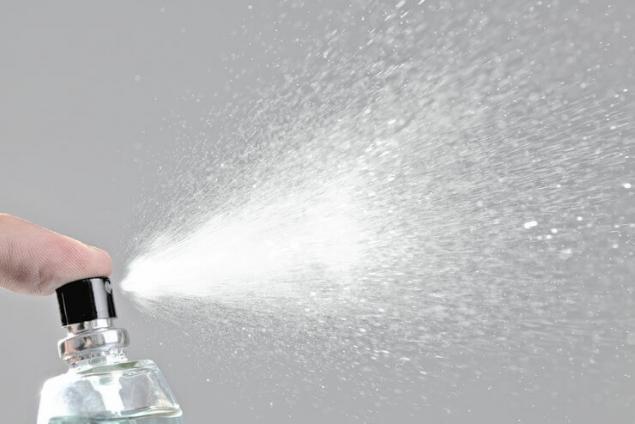595
THAT the smell in perfume: the truth about the spirits and perfumes
The smell this perfume? They smell nice, but they smell so good? The stores offer perfume with citrus, woody, floral aromas, and so on, but this does not mean that in their composition have a shred of natural substances. And no one will tell you what substances make perfume composition, since it is considered a trade secret, and manufacturers are not required to specify them.
The composition of the perfume may include dozens or even hundreds of chemical compounds. Most often used in perfumery synthetic chemicals because their cost is much lower than the cost of natural essential oils, synthetic flavors are more resistant.

It is understood that the perfumes are the main ingredient in perfumes, colognes and deodorants, but they are also used in almost all cosmetics and personal care products.
Furthermore, flavoring agents may be found in many consumer products, in particular in detergents, conditioners and cleansers. Even when the product is labeled as «fragrance-free», ie "Odorless", in fact it may contain flavoring with a masking agent that blocks the perception of the smell of the brain.
Is it safe to allow the manufacturer to independently control the toxicity of the product?
Perfume industry is allowed to self-regulate themselves through a trade association known as the International Perfumery Association (IFRA). This association is responsible for testing the safety of ingredients for use in industry.
The perfume is used more than 5000 different ingredients, but still only about 1,300 of them actually have been tested for toxicity. Another question is how independent industry research institute that carried out the tests. Samuel Epstein (Samuel Epstein), MD, Chairman of the Cancer Prevention Coalition, warns:
"This testing is minimal and limited to local effects on the human skin and short-term toxicity test on rodents»
. for health and environmental harm spirits
If you suffer from sensitivity to chemicals, then you know how hard it is to live with it. Many of the components that are not listed as part of fragrances are irritants and can cause allergies, migraine and asthma symptoms.
A survey of people with asthma found that perfumes and / or colognes cause seizures in almost three out of four people. There is also evidence that the spirits can exacerbate asthma, and may even contribute to its development in children.
People with multiple chemical sensitivity (MCS) or diseases, which are caused by the environment, particularly vulnerable. Fragrances can be an impetus to development of the disease or cause symptoms.
However, anyone can experience skin irritation, watery eyes, or runny nose. British researchers report that the perfume is the second most common cause of allergies in patients dermatological clinics. In addition, laboratory experiments with the individual ingredients of fragrances have shown, among other adverse health effects, and ihneyrotoksichnost connection with the development of cancer.
Of particular concern from an environmental point of view it is used in perfumery synthetic musk. Some of the compounds of synthetic musk has a particularly resistant and can be integrated (bioaccumulate) in the fatty tissues of aquatic organisms. Studies have shown that in fish from the Great Lakes in North America is a measurable quantity of synthetic musk and its content increases.
Some ingredients of fragrances are not the fragrances themselves, and increase the overall intensity of the odor. For example, diethyl phthalate (diethyl phthalate), or DEP, is widely used in perfumery for fixing aroma. Phthalates in cosmetics are often used because of their low cost and versatility.
However, the European Commission DEP endocrine disorders classified as a substance of category 1, which upset the normal hormonal function. Also included in the list diethyl particularly toxic pollutants in the Clean Water Act in the United States.
Phthalates are linked to early puberty girls, reduced sperm count in men, reproductive defects in the developing male fetus (when the mother is exposed to phthalates during pregnancy).
Metabolites of phthalates are also associated with obesity and insulin resistance in men. Also, there is evidence that exposure to phthalates can lead to liver and kidney dysfunction in young children when they suck or chew for a long time, products containing phthalates.
Laboratory analysis of the best-selling colognes and perfumes showed that the product contains an average of 14 chemicals not listed on the label, which can cause allergic reactions or interfere with hormonal function.
The European Union has limited the use of many perfume ingredients, including two of the most commonly used synthetic musks (nitromusks), and requires warning labels on products if they contain any of 26 allergens used as cosmetic fragrances.
Alternative toxic perfumes
If you still want to use perfume, it is to protect yourself and others, it is best to avoid synthetic fragrances and switch to natural fragrances made from essential oils. Importantly, however, that the essential oil is not the same as the perfume oil.
Essential oils are produced from plants, while perfume oils frequently contain synthetic chemicals. Although perfume oils may smell good and are generally cheaper, they do not provide the therapeutic effect of essential oils and may be safer than conventional perfumes. Therefore, before use, make sure that the essential oil of the highest quality and 100% pure.
Also pay attention to the fact that essential oils should be used with caution, especially during pregnancy, as they can very much affect on the body, even in small quantities. Before experimenting with oils is best to consult with a man versed in aromatherapy.
Author: Anastasia Litvinova
The composition of the perfume may include dozens or even hundreds of chemical compounds. Most often used in perfumery synthetic chemicals because their cost is much lower than the cost of natural essential oils, synthetic flavors are more resistant.

It is understood that the perfumes are the main ingredient in perfumes, colognes and deodorants, but they are also used in almost all cosmetics and personal care products.
Furthermore, flavoring agents may be found in many consumer products, in particular in detergents, conditioners and cleansers. Even when the product is labeled as «fragrance-free», ie "Odorless", in fact it may contain flavoring with a masking agent that blocks the perception of the smell of the brain.
Is it safe to allow the manufacturer to independently control the toxicity of the product?
Perfume industry is allowed to self-regulate themselves through a trade association known as the International Perfumery Association (IFRA). This association is responsible for testing the safety of ingredients for use in industry.
The perfume is used more than 5000 different ingredients, but still only about 1,300 of them actually have been tested for toxicity. Another question is how independent industry research institute that carried out the tests. Samuel Epstein (Samuel Epstein), MD, Chairman of the Cancer Prevention Coalition, warns:
"This testing is minimal and limited to local effects on the human skin and short-term toxicity test on rodents»
. for health and environmental harm spirits
If you suffer from sensitivity to chemicals, then you know how hard it is to live with it. Many of the components that are not listed as part of fragrances are irritants and can cause allergies, migraine and asthma symptoms.
A survey of people with asthma found that perfumes and / or colognes cause seizures in almost three out of four people. There is also evidence that the spirits can exacerbate asthma, and may even contribute to its development in children.
People with multiple chemical sensitivity (MCS) or diseases, which are caused by the environment, particularly vulnerable. Fragrances can be an impetus to development of the disease or cause symptoms.
However, anyone can experience skin irritation, watery eyes, or runny nose. British researchers report that the perfume is the second most common cause of allergies in patients dermatological clinics. In addition, laboratory experiments with the individual ingredients of fragrances have shown, among other adverse health effects, and ihneyrotoksichnost connection with the development of cancer.
Of particular concern from an environmental point of view it is used in perfumery synthetic musk. Some of the compounds of synthetic musk has a particularly resistant and can be integrated (bioaccumulate) in the fatty tissues of aquatic organisms. Studies have shown that in fish from the Great Lakes in North America is a measurable quantity of synthetic musk and its content increases.
Some ingredients of fragrances are not the fragrances themselves, and increase the overall intensity of the odor. For example, diethyl phthalate (diethyl phthalate), or DEP, is widely used in perfumery for fixing aroma. Phthalates in cosmetics are often used because of their low cost and versatility.
However, the European Commission DEP endocrine disorders classified as a substance of category 1, which upset the normal hormonal function. Also included in the list diethyl particularly toxic pollutants in the Clean Water Act in the United States.
Phthalates are linked to early puberty girls, reduced sperm count in men, reproductive defects in the developing male fetus (when the mother is exposed to phthalates during pregnancy).
Metabolites of phthalates are also associated with obesity and insulin resistance in men. Also, there is evidence that exposure to phthalates can lead to liver and kidney dysfunction in young children when they suck or chew for a long time, products containing phthalates.
Laboratory analysis of the best-selling colognes and perfumes showed that the product contains an average of 14 chemicals not listed on the label, which can cause allergic reactions or interfere with hormonal function.
The European Union has limited the use of many perfume ingredients, including two of the most commonly used synthetic musks (nitromusks), and requires warning labels on products if they contain any of 26 allergens used as cosmetic fragrances.
Alternative toxic perfumes
If you still want to use perfume, it is to protect yourself and others, it is best to avoid synthetic fragrances and switch to natural fragrances made from essential oils. Importantly, however, that the essential oil is not the same as the perfume oil.
Essential oils are produced from plants, while perfume oils frequently contain synthetic chemicals. Although perfume oils may smell good and are generally cheaper, they do not provide the therapeutic effect of essential oils and may be safer than conventional perfumes. Therefore, before use, make sure that the essential oil of the highest quality and 100% pure.
Also pay attention to the fact that essential oils should be used with caution, especially during pregnancy, as they can very much affect on the body, even in small quantities. Before experimenting with oils is best to consult with a man versed in aromatherapy.
Author: Anastasia Litvinova
A place where things die, why we must abandon the organizers
Scientists have found the most effective plant for the production of biofuels























